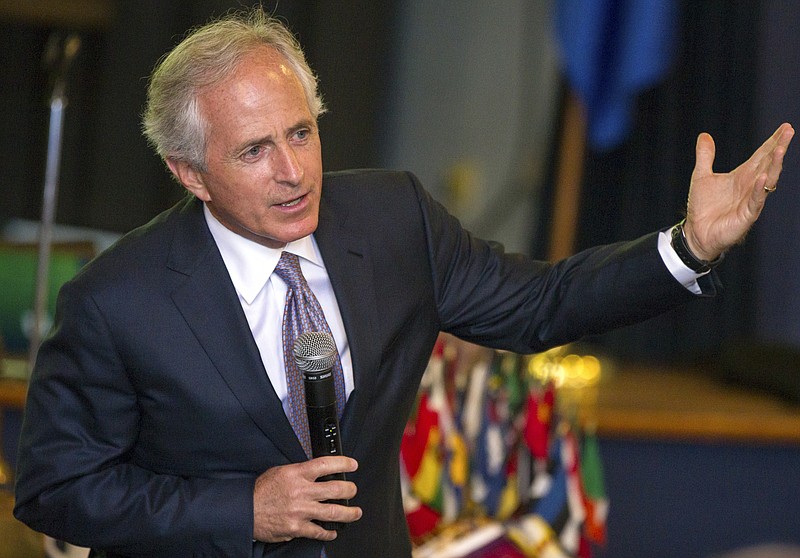A non-nuclear Iran is now a pipe dream -- gone with the wind, off the table.
So it is vital for the U.S. Senate to pass a bill by Sen. Bob Corker, R-Tenn., that would give Congress the ability to review and approve an agreement that would limit the Middle Eastern country's nuclear program.
During negotiations over the last several years, Iran "craftily" turned the deal to its advantage, Corker, the Senate Foreign Relations Committee chairman, told reporters and editors Thursday in an editorial board meeting at the Times Free Press.
What began as a discussion about the dismantling of the country's nuclear program has resulted in a tentative deal -- a verbal "political" deal at this point -- about the "managed proliferation" of the program. And what started as a 20-year deal with the possibility of a 10-year extension has largely become a 10-year deal, he said.
The goal, Corker said, was to keep Iran from getting nuclear weapons. That possibility is gone because, as he said has been pointed out in national publications, "we kept moving toward their position." Now, he said, "you [can't] go back."
That's why it's so important for the bill, on which discussion will begin next week, to pass. The measure has strong bipartisan support, especially with the addition of future Senate Minority Leader Chuck Schumer, D-N.Y., but Democrats are wobbling.
Already, 144 amendments have been proposed, including ones by Democratic senators that would remove language requiring the administration to certify Iran no longer supports terrorism and allow President Barack Obama to roll back congressional sanctions on Iran without Congress reviewing and approving the deal.
Further, a coalition of liberal groups, including Democracy for America and MoveOn.org Political Action, have threatened to retaliate against Democrats who support the bill.
But Corker is hopeful.
"I hope we get a deal," he said. "All of us want to see a negotiated agreement."
Congressional approval would assure it's the best possible deal.
In fact, said Corker, he is certain the possibility of congressional approval already has strengthened the U.S. hand in the negotiations.
His bill, the former Chattanooga mayor told Rotarians later Thursday, would assure "transparency, oversight and compliance."
It would give Congress a role to play on behalf of the U.S. people, would give Congress 60 days to examine the agreement, and, if agreed to, would demand Congress receive regular reports of conformity on verification and inspection, he said.
"America," Corker said, "is indispensable as it relates to issues around the world."
With that, he told Rotarians, he believes the Iran deal is the most important foreign policy issue America is facing -- ahead of China's strengthening of its position in the South China Sea, ahead of Russia's attempt to destabilize Ukraine and ahead of the growth of the Islamic State in the Middle East.
Obama called Corker to talk about the potential deal Wednesday, but neither Corker nor a White House spokesman would characterize the discussion.
But Tennessee's junior senator did say he told the president that congressional examination of a nuclear deal with Iran would allow necessary questions to be asked, would assure the details were combed through and would, ultimately, be "positive for you, for the country and for the [Middle East] region."
The final agreement will not be hammered out before late June, but a potential deal with a promise-breaking, agreement-violating, terrorist-sponsoring nation is unprecedented.
Given just the details the American public has been told, Iran will be able to almost instantly revert to creating a bomb when the 10-year agreement expires. With sanctions removed, it can have a roaring economy instead of the limits put on it now. And Iran is unlikely to be any less secretive than it has been for the last 30-plus years when it comes to its weapons programs.
At this point, no deal looks better than a bad deal.
But congressional approval would assure the American people that, while they will never see the non-nuclear Iran they were once promised, they can be confident of the best possible safeguards against the reckless and ruthless country.
